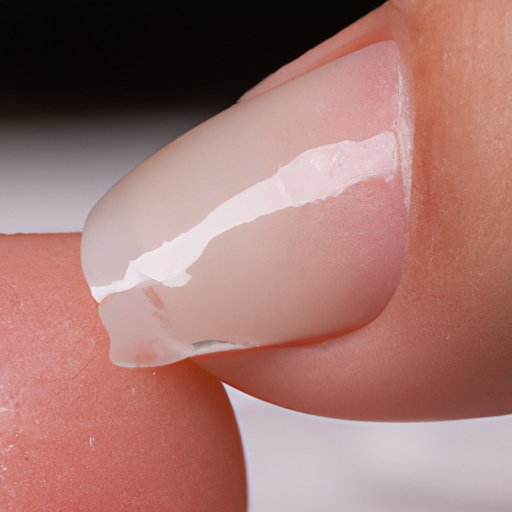
I. Introduction
Getting glue on nails can be frustrating, especially when it accidentally sticks to the cuticles or skin around the nails. Knowing how to remove glue on nails properly is essential to avoid damaging the natural nails. In this guide, we will explore the different methods you can use to remove glue on nails and provide helpful tips to achieve the best results.
II. The classic approach: Soaking and scraping
The classic approach to remove glue on nails involves soaking the nails in warm water and then gently scraping the glue off using a cuticle pusher or an orange stick. Here are the steps:
- Fill a small bowl with warm water.
- Soak your nails in the water for at least 10 minutes.
- Take the nails out of the water and gently scrape off the glue using a cuticle pusher or an orange stick.
To make the process more efficient, you can add a small amount of dish soap to the warm water to help loosen the glue. However, be sure to be gentle and not scrape too hard, as this can cause damage to the natural nails.
III. The oil trick
The oil trick involves using oil to soften the glue before removing it. Here are the steps:
- Apply a small amount of oil, such as coconut oil, olive oil, or baby oil, to the glue on your nails.
- Let the oil sit for 5-10 minutes to soften the glue.
- Gently scrape off the glue using a cuticle pusher or an orange stick.
Be sure to use only a small amount of oil, as too much oil can cause the glue to become even more stubborn. Additionally, use a gentle touch when scraping off the glue to avoid damaging the natural nails.
IV. Using acetone
Acetone is a solvent that is commonly used to remove nail glue. However, it can be harsh on the skin and nails, so it should be used with caution. Here are the steps:
- Prepare a small bowl of acetone and dip your nails in it for 5-10 minutes.
- Gently scrape off the softened glue using a cuticle pusher or an orange stick.
- Rinse your nails with warm water and apply a moisturizing cream or oil to replenish the moisture lost during the acetone soaking process.
Be sure to use acetone in a well-ventilated area to avoid inhaling fumes. Additionally, avoid using acetone too frequently, as it can cause dryness and brittleness in the natural nails.
V. The white vinegar method
White vinegar can also be used to dissolve the glue on nails. Here are the steps:
- Prepare a small bowl of white vinegar and soak your nails in it for at least 15 minutes.
- Gently scrape off the softened glue using a cuticle pusher or an orange stick.
- Rinse your nails with warm water and apply a moisturizing cream or oil to replenish the moisture lost during the vinegar soaking process.
Be sure to dilute the vinegar with water to minimize skin irritation. Additionally, avoid using vinegar too frequently, as it can cause dryness and weakening of the natural nails.
VI. Filing off the glue
If the glue is too stubborn to remove with soaking or oiling, a nail file can be used to file off the glue. Here are the steps:
- Select a nail file with a fine grit level, such as 240 or 320.
- Gently file the glue off until it is completely removed.
- Buff the nails with a buffer file to smooth out any rough edges or unevenness.
Be sure to file with a light touch and avoid over-filing, as this can cause damage to the natural nails. Additionally, do not use a coarse grit level, as this can cause further damage and weakening of the natural nails.
VII. Using a specialized product
There are also specialized products available on the market that are designed for removing glue on nails. These products contain ingredients that dissolve the glue without damaging the natural nails. Here are the steps:
- Select a glue remover product from a reputable brand.
- Follow the instructions on the product for application and removal.
- Rinse your nails with warm water and apply a moisturizing cream or oil to replenish the moisture lost during the removal process.
Be sure to follow the instructions on the product carefully to avoid damaging the skin or nails. Additionally, avoid overusing these products to prevent dryness and brittleness in the natural nails.
VIII. Conclusion
Overall, there are several methods available to remove glue on nails, each with its own advantages and disadvantages. The classic approach of soaking and scraping is gentle and efficient, while the oil trick is a natural alternative that is also effective. Acetone and specialized products are more aggressive, but should be used with caution and following the instructions carefully. Lastly, filing off the glue is a quick solution, but should be done with care to avoid damaging the natural nails.
When removing glue from nails, it is important to prioritize nail health and avoid using harsh or damaging methods. Be sure to moisturize the nails and cuticles after removal, and consider taking a break from nail art to let the natural nails recover. With these tips and methods, you can easily and safely remove glue on nails.





